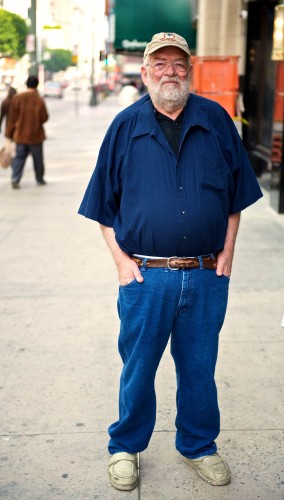We Are An Inferior & Superior Beast
Cousin Kron Menuhin, a rural kingpin, in his field in Australia;
Lionel Rolfe, Kron’s citified cousin, speaking from the streets. Photo by Gary Leonard
By LIONEL ROLFE
I know of someone who had almost nothing to recommend him. You wouldn’t really want me to write about this person, but I am doing it anyway. He was a very ugly and dreary man who lived in a rural section of Melbourne.
We had driven onto his strange old farm and were immediately met by big nasty dogs. Luckily we were in my cousin’s car. With an angry snarl, the man came forth. I was in a car driven by the man who had sold him his ranch house a while back and they were supposedly good friends. But when my driver, cousin Kron, got out of his car, one of the dogs came up and bit him. Not hard, but hard enough. Kron got back in the car.
The man’s effect on my mood was enormous and immediate. The doors to his house looked like they were the entrances to a shriveling but gigantic dirty shed. The man himself look like the appurtenances to his shed-house. I should also explain that the “shed” was actually a large building, but I doubt it had any living areas in it. At one point, I looked through a door leading to the kitchen. The kitchen though never looked like a kitchen. I suspect he used it to make dead rats into dinner—whatever he was cooking there, I had no desire to look further. I suspect the rats were seasoned with cockroaches. When my cousin Kron owned the house, I’m sure it was a lovely Australian abode—but it no longer was.
Kron drove me onto the site that the rambling home topped. He found his man, who was going in for an operation that would keep him walking. They then told him he’d have to go in for rehabilitation. As he’s talking, a colleague pulls up.
As we’re talking, a man drives up on a motorbike. Kron, meanwhile, leans out of his window. They sort of play the Australian dozens, talking about dogs and such. When his friend says he’s going in for the operation, but not the rehab, Kron laughs.
Kron says, “you’ll have to go in for rehab.” I think Kron sensed how uncomfortable the man made me feel about him. He thought I was a bit put off by this “real mountain man type” with a twisted face and missing several of his teeth. He struck me as both stupid and cantankerous and annoying to be around.
The odd man on the motorbike looked a lot like his boss.With real concern, he said ”There’s a ‘crook bull’ in the field.” A “crook bull,” I later learn, means a sick bull. “Poor thing,” he says, as you can hear the bellowing beast in the distance lying down by a fence several yards away.
The man on the motorbike says “Damn,” and roars off without a further word. Kron’s’ friend tried to tell his friend his knee surgery would cause problems and if he had the operation, he’d have to go through rehab too. He was sure of that. His boss was not so sure of that.
I was glad we were leaving. There was a sense of decay and death about the place.
I had once before, perhaps 50 years ago, dealt with rural values in California that reminded me of this outback portion of Melbourne. I told Kron of my small rural town in California notorious for the odd and strange relationships people have there. I’m about Atascadero in the mid-coastal mountainous region of the Pacific Ocean near Pismo Beach where every one seem to literally be literally kissing cousins. Atascadero is half way between Los Angeles and San Francisco.
Not all the down and outers of this world are poor. Some are monarchs. They probably are as disgusting as the poor, these rich. Truth is, us people can be inferior and superior beings, I know that for sure, whatever my politics.
Atascadero was a few miles east of the Pacific, on rolling inland hill territory. It was sort of a big and graying looking area, made especially so by the restaurant. Other than Atascadero, most of the land was sunny and light full of fresh trees and clean porcelain shores. But not Atascadero, anymore than the place on the outskirts of Melbourne was. Perhaps it was because the citizens were strange in their look—there was something especially stupid about their faces; their food was string y and tasteless in the restaurant. Dessert was a short of tasteless pudding of unclear flavor. All the people eating there were only somewhat human in appearance.
Served in huge baskets, the bread was all white. The meat sat beside them without flavor. and looked stringy and tasteless. A lot of tasteless potatoes were added into it too. I know potatoes can be very good. But they weren’t in this case. Dessert was some sort of tasteless pudding of an unclear flavor—matching the conversation.
Mostly, however, the people sat in silence, or they made rude, unpleasant noises that all sounded like they were nothing more than threats. Like the man in the Melbourne outback. The food was unpleasant but plentiful. I couldn’t quite make much sense of it all until I talked to a local newspaper editor there who told me what was really unnerving about the place.
Many of these people are definitely kissing cousins. They look too much alike. They seem to be rather stupid. The whole thing was unnerving. The editor said these people were “highly retaliated—literarily.” I suspect this guy in Melbourne was also “highly related.”
I know it’s taken me a while to get to one of the odder of human beings. Like every one else, I have been thinking of Donald Trump, a scummy man who somehow reminds me of the fellow in Melbourne. I can’t tell you if Trump is more like the dog that bit Kron, or the farmer who set the situation up.
It probably is not accidental that Mr. Trump thinks he’s highly intelligent and these folks are not. Maybe he is—but I doubt it. He is a student of Wharton, which is regarded as one of the nation’s best business schools. But I’m not sure if a business college or university is anything special. A business school is where folks like Trump pretend like they’re intelligent, as if a business school is somehow the equivalent of a university of physics or even of the arts.
I suspect that Trump is closer in genius and brilliance to the guy from Melbourne or the folks in Atascadero than much more. But Trump keeps telling me he’s a genius, a brilliant man, a billionaire. I guess he is part of the ruling class. But at heart he is trailer trash and I’m not sure a business graduate can really be much more than that.
Certainly there is more imperfection than perfection in this most terrible of the human condition. I think there are some magnificent creatures in this world—Bela Bartok, the Hungarian composer, was in my view the greatest composer of the 20th century.
I feel a connection to this yarn because my uncle, the violinist Yehudi Menuhin, played the Bartok Violin Concerto No 2 at the Hollywood Bowl with the Los Angeles Philharmonic in 1945 Antal Dorati was the conductor. Yehudi was a friend of Bartok and once they had a conversation about the work during which Bartok, who had written the work in 1937, asked Yehudi if he had noted his comments on the work.
Bartok was very sad about his native land, where even his native Hungary was a becoming a “system of robbers and murderers” toward the end of his life there.
Bartok had written a solo violin concerto for Yehudi as one of his last works. Bartok, as it happened, was never a fan of Arnold Schoenberg, took over Hungary. Toward the end of his life, Bartok wrote a solo violin work for him.
Bartok was never a fan of Arnold Schoenberg, who came to Los Angeles with his beloved atonal system. So he asked Yehudi what he thought of his comments, and Yehudi replied, “It’s rather chromatic.” Bartok agreed—he said he wanted to show “that one can use all 18 tones and still remain tonal.” One of Bartok’s barbs: “…and any one of those repeated sequences would supply a dodecaphonist with material for a whole opera…”
I suppose I could match Trump and Schoenberg as not much better than the folks in the outranks of Melbourne or the heartland of Atascadero.
Bartok was referring to Schoenberg’s theory which said that his atonal theory represented something modern—even if it was never science; it was numerology. I had grown up with discussion on Schoenberg at various soirees held at my mom’s house. Among the conversant were such composers as Mario Castelnuovo-Tedesco, Darius Milhaud, George Anthill and others—all competitors to Schoenberg. They did not like him and they thought his atonal music absurd.
They also liked Thomas Mann’s “Doctor Faustus,” whose protagonist Leverkuhn was Arnold Schoenberg. Leverkuhn was one of the great fraudulent composers of the 20th century.
I wrote a series of articles on classical composers in Los Angeles for the Times, and I was soon enough attacked by Charles Champlain. Champlain was the Times’ film critic and art critic, a veteran of Life Magazine. Once he walked right into me in the hallway and berated me with being despicable for writing about Schoenberg.
I knew at the time that that the LA Times was supporting the Schoenberg Institute at USC and UCLA. By The 80s, attacking Schoenberg in the pages of the Times was not legal. A music critic who is still writing for the Times told me that attacking Schoenberg was virtually verboten for the paper’s staff. The reason wasn’t important. Buffy Chandler, one of the publishers, knew little about classical music but wanted everyone to appreciate her for supporting it. They built the Buffy Chandler Music Institute to honor her love of classical music and it is said that she didn’t like Schoenberg, but knew all the wise men did.
So Bela Bartok or Thomas Mann rejected the idolization off Schoenberg, but still it went off. In this case though, the idea was to sanctify the philanthropic values of the owner of newspaper proprietor, based not on anything musical or ideological.
The insanity of the owners of the newspaper made them no better sense than Schoenberg or Trump. But it was part of the ugliness that distinguishes the superiority and influence in man’s doings. It might be what keeps the ugliness of mankind alive.
*
Lionel Rolfe is the author of various books, including “Literary L.A.,” “The Menuhins: A Family Odyssey” and several others on Amazon’s electronic and paperback list.
Comments
Leave a Reply
You must be logged in to post a comment.





